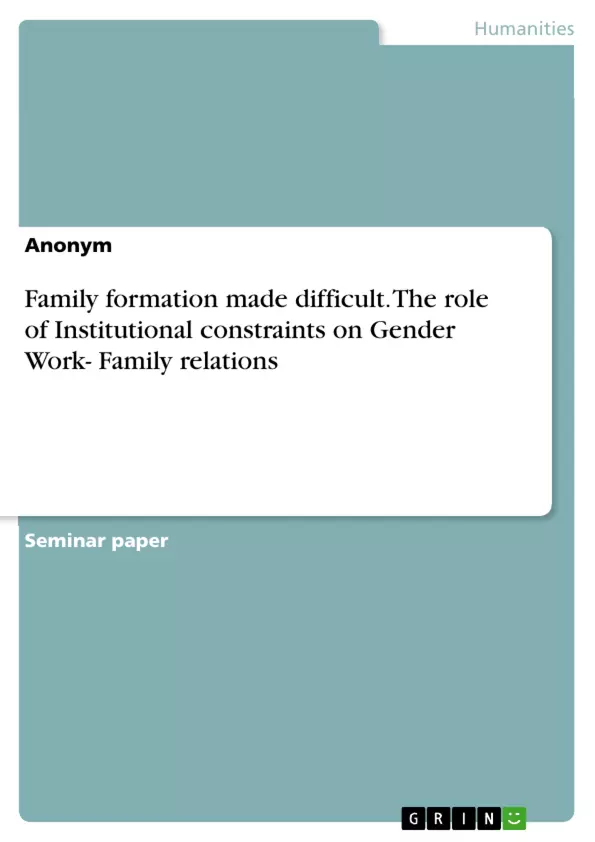This paper discusses research on the macro (the institutional) level about social patterns that affect families as a whole as well as the individuals personal and occupational lives. The role and the importance of institutional structures are discussed for their impact on patterns of work and hence, the opportunities and challenges that parents face within family life are examined. Therefore, institutional arrangements affecting gender equality, parental leave (with explicit views on both maternal and paternal leave), education, divorce, and fertility are analyzed. This paper seeks to examine the interplay of the macro-structures of institutions and the micro-structures of families.
Table of Contents
- Family relations
- Introduction
- Relevance
- Overview of the structure
- Method
- Work environment and stereotypical gender roles
- Private and domestic spheres
Objectives and Key Themes
This research paper examines the impact of institutional systems on family structures with regard to gender equality. The paper focuses on the macro level of societal structures and their effect on families as a whole, as well as the individual lives of family members. The research investigates how institutional frameworks influence work-family relations and the development of egalitarian or unequal gender roles within a work-family context.
- Impact of institutional constraints on family structures and gender equality
- Role of institutional structures in shaping work-family relations
- Analysis of institutional arrangements affecting gender equality, including parental leave, education, divorce, and fertility
- Interplay between macro-structures of institutions and micro-structures of families
- Exploring the challenges and opportunities faced by parents within family life
Chapter Summaries
- The first chapter introduces the research topic and its relevance, highlighting the ongoing debate about the impact of institutional constraints on family structures and the increasing challenge of combining work and family life. It emphasizes the role of gender ideologies and stereotypical gender roles in shaping family dynamics and underscores the importance of understanding how institutions influence work-family structures and gender equity.
- The second chapter details the research methodology, focusing on a literature review of relevant research related to institutional and work-family structures. The geographical and historical scope of the study is defined, outlining the key countries and time periods included in the analysis.
- The third chapter presents a review of existing literature on institutional approaches to family structures, examining how institutional regulations can both constrain and empower families and parents. The chapter explores the influence of gendered workplace norms and laws on the ability of men and women to achieve equal regulations in their private lives. It further delves into the potential and limitations of institutional frameworks in supporting families to combine work and family life, with specific focus on parental leave systems and public daycare.
Keywords
The primary keywords and focus topics of the research are: institutional constraints, work-family relations, gender inequality, family regulations, gender equality, parental leave, education, divorce, fertility, private and domestic spheres, gender ideologies, stereotypical gender roles, work-life balance, and gender equity.
- Quote paper
- Anonym (Author), 2020, Family formation made difficult. The role of Institutional constraints on Gender Work- Family relations, Munich, GRIN Verlag, https://www.grin.com/document/1015108



